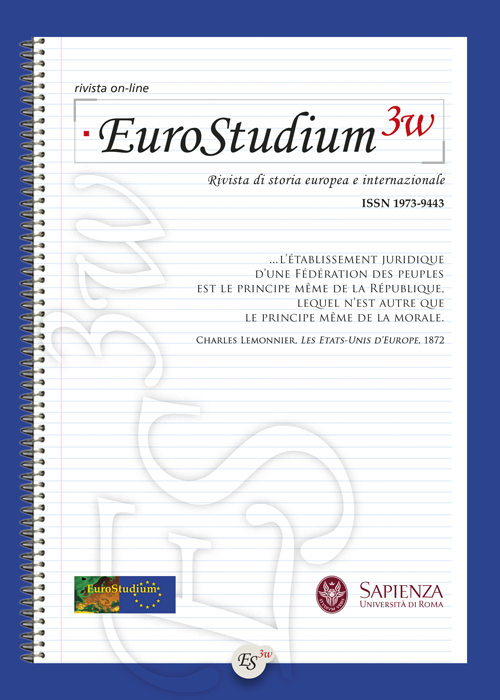La religione de l’Association. Ancora agli esordi del pensiero federale europeo
Parole chiave:
Sansimonism, Charles Lemonnie, publications, new religion, AssociationAbstract
This contribution is a continuation of the survey previously carried out, and also published in «EuroStudium», relating to the contents and promoters of the «Revue philosophique et religieuse», a significant magazine inspired by Saint-Simonism published in the second half of the 1850s., before incurring Napoleonic censorship. To this end, this research has been dedicated to the editorial initiatives subsequent to the aforementioned revue, focusing in particular on the primary role exercised once again by the philosopher, jurist and industrial executive Charles Lemonier, the promoter of associationism for the United States of Europe initiated with the famous Congress of Peace and Freedom, held in Geneva in 1967 and lasted well beyond. Specifically, the contribution focuses on the very relevant presentation made by Lemonnier to the edition of Saint-Simon’s Selected Works, printed in Brussels in ‘59, as well as on what he provided in the volume Ébauche d’un Glossaire du Langage Philosophique, published in 1863 by Léon Brothier, his colleague and companion of Saint-Simonism. The ambitious goal of these publications was to affirm in the culture and politics of the century the “Association” inherited from Saint-Simon and reworked as a “dogma” based on the laws of the entire universal order, or as a “religion” of human progress set on the triadic gravitation between science, morality and industry. Such a religion would have been such as to unite the different components of Saint-Simonism and to face communist-inspired internationalism, in the perspective of a substantial European unity based on the new innovative principles, replacing all ancient beliefs. The research also highlights the connection between cultural initiatives of this importance (very close to the Masonic world) and significant industrial environments heavily engaged in technological and production innovation, as well as in the opening of trade frontiers worldwide. A context in which Lemonnier and Brothier himself, both professionally employed by the renowned industrial-bankers Pereire, stand out as instructive protagonists, far from being without foresight. Moreover, their criticism of the third Napoleonic regime continued to be evident, compared to the attitudes of compromise prevailing in these circles. Finally, it should be noted that, with the progressive prevalence of Prussian-Germanic power over the ’89 French model, the fides of Saint-Simonian heritage left room to the re-emergence of the Kantian ethic and its prophecy of perpetual peace as an irreplaceable message for European nations. But even on these further investigations would be really desirable.##submission.downloads##
Pubblicato
2022-03-03
Fascicolo
Sezione
Saggi e ricerche
Licenza
Copyright (c) 2022 Eurostudium3w

Questo lavoro è fornito con la licenza Creative Commons Attribuzione - Non commerciale - Condividi allo stesso modo 4.0 Internazionale.


